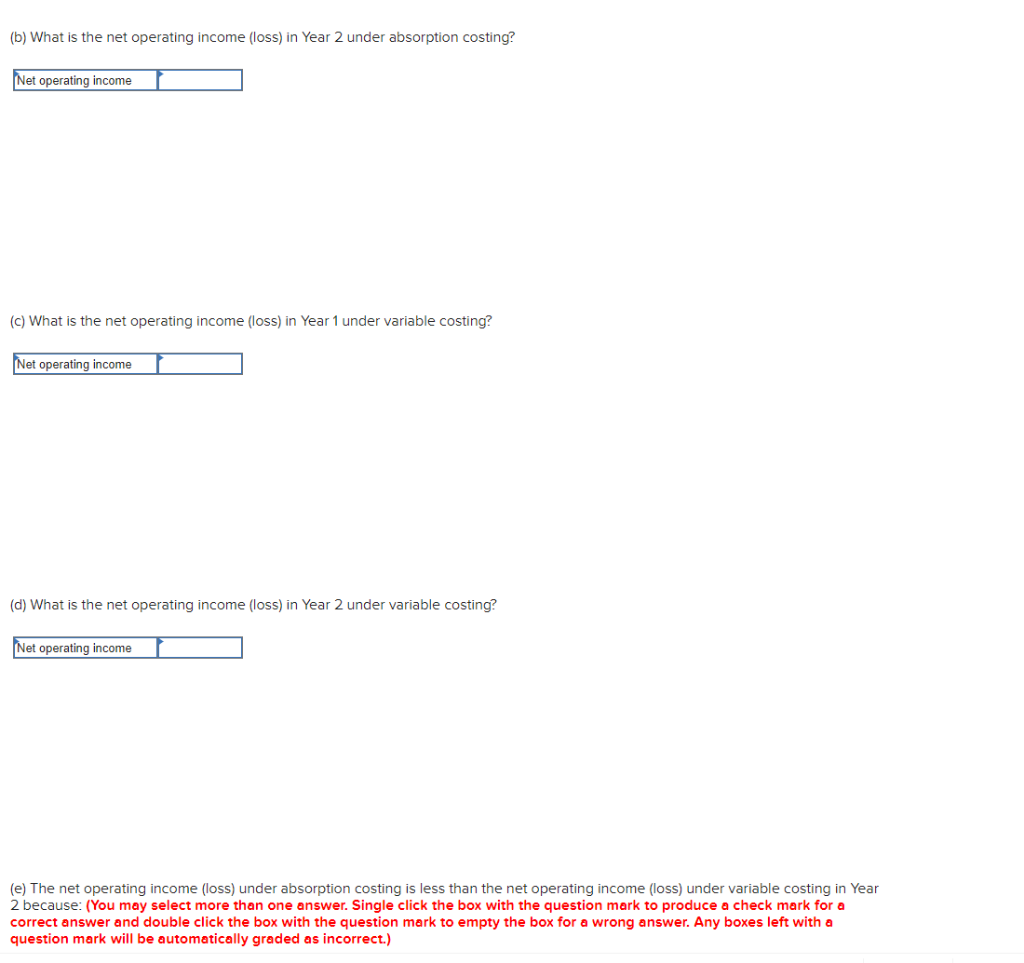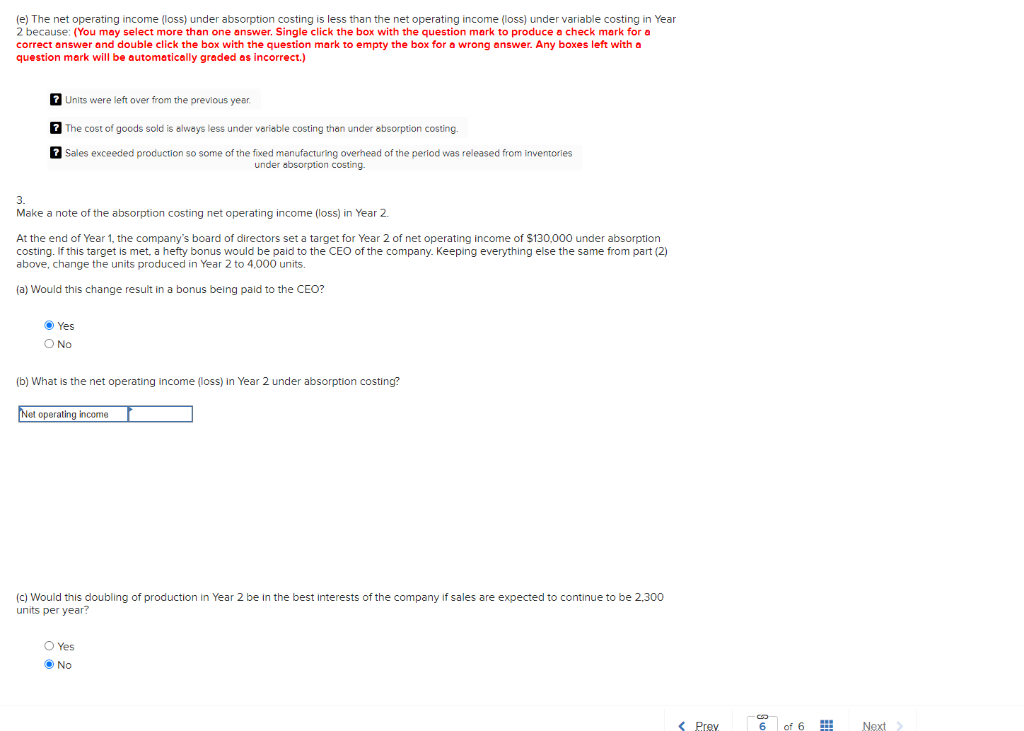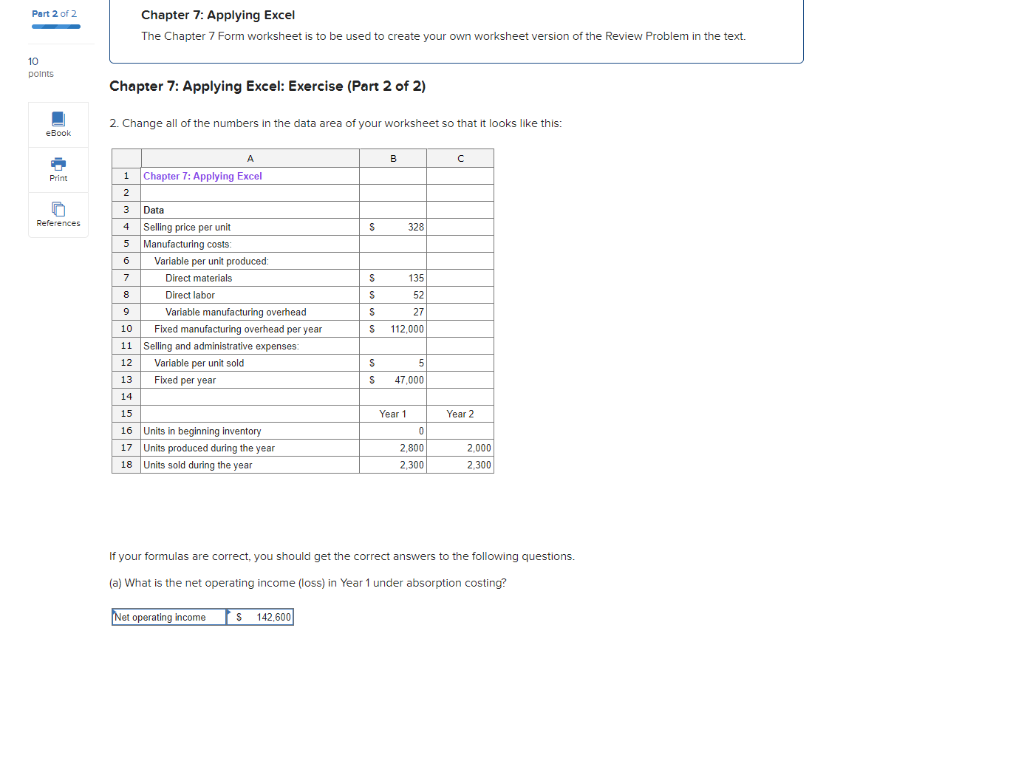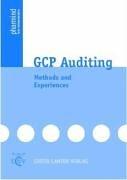


(b) What is the net operating income (loss) in Year 2 under absorption costing? (c) What is the net operating income (loss) in Year 1 under variable costing? (d) What is the net operating income (loss) in Year 2 under variable costing? (e) The net operating income (loss) under absorption costing is less than the net operating income (loss) under variable costing in Year 2 because: (You may select more than one answer. Single click the box with the question mark to produce a check mark for a correct answer and double click the box with the question mark to empty the box for a wrong answer. Any boxes left with a question mark will be automatically graded as incorrect.) (e) The net operating income (loss) under absorption costing is less than the net operating income (loss) under variable costing in Year 2 because: (You may select more than one answer. Single click the box with the question mark to produce a check mark for a correct answer and double click the box with the question mark to empty the box for a wrong answer. Any boxes left with a question mark will be autometically graded as incorrect.) Units were left over from the previous year. The cost of goods sold is always less under variable costing than under absorption costing. Sales exceeded production so some of the fixed manufacturing overhead of the period was released from inventories under absorption costing. 3. Make a note of the absorption costing net operating income (loss) in Year 2. At the end of Year 1, the company's board of directors set a target for Year 2 of net operating income of $130,000 under absorption costing. If this target is met, a hefty bonus would be paid to the CEO of the company. Keeping everything else the same from part (2) above, change the units produced in Year 2 to 4,000 units. (a) Would this change result in a bonus being paid to the CEO? Yes No (b) What is the net operating income (loss) in Year 2 under absorption costing? (c) Would this doubling of production in Year 2 be in the best interests of the company if sales are expected to continue to be 2,300 units per year? Yes No Chapter 7: Applying Excel The Chapter 7 Form worksheet is to be used to create your own worksheet version of the Review Problem in the text. Chapter 7: Applying Excel: Exercise (Part 2 of 2) 2. Change all of the numbers in the data area of your worksheet so that it looks like this: If your formulas are correct, you should get the correct answers to the following questions. (a) What is the net operating income (loss) in Year 1 under absorption costing? (b) What is the net operating income (loss) in Year 2 under absorption costing? (c) What is the net operating income (loss) in Year 1 under variable costing? (d) What is the net operating income (loss) in Year 2 under variable costing? (e) The net operating income (loss) under absorption costing is less than the net operating income (loss) under variable costing in Year 2 because: (You may select more than one answer. Single click the box with the question mark to produce a check mark for a correct answer and double click the box with the question mark to empty the box for a wrong answer. Any boxes left with a question mark will be automatically graded as incorrect.) (e) The net operating income (loss) under absorption costing is less than the net operating income (loss) under variable costing in Year 2 because: (You may select more than one answer. Single click the box with the question mark to produce a check mark for a correct answer and double click the box with the question mark to empty the box for a wrong answer. Any boxes left with a question mark will be autometically graded as incorrect.) Units were left over from the previous year. The cost of goods sold is always less under variable costing than under absorption costing. Sales exceeded production so some of the fixed manufacturing overhead of the period was released from inventories under absorption costing. 3. Make a note of the absorption costing net operating income (loss) in Year 2. At the end of Year 1, the company's board of directors set a target for Year 2 of net operating income of $130,000 under absorption costing. If this target is met, a hefty bonus would be paid to the CEO of the company. Keeping everything else the same from part (2) above, change the units produced in Year 2 to 4,000 units. (a) Would this change result in a bonus being paid to the CEO? Yes No (b) What is the net operating income (loss) in Year 2 under absorption costing? (c) Would this doubling of production in Year 2 be in the best interests of the company if sales are expected to continue to be 2,300 units per year? Yes No Chapter 7: Applying Excel The Chapter 7 Form worksheet is to be used to create your own worksheet version of the Review Problem in the text. Chapter 7: Applying Excel: Exercise (Part 2 of 2) 2. Change all of the numbers in the data area of your worksheet so that it looks like this: If your formulas are correct, you should get the correct answers to the following questions. (a) What is the net operating income (loss) in Year 1 under absorption costing









